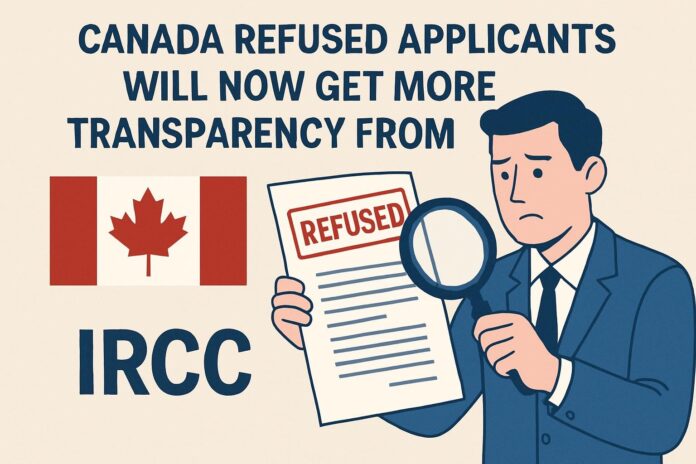Canada’s Immigration, Refugees and Citizenship Canada (IRCC) has rolled out a major update that will bring relief, clarity, and improved communication to thousands of applicants whose visa or permit requests are refused.
Starting July 29, 2025, IRCC will now automatically include officer decision notes with most refusal letters—giving applicants a clearer understanding of why their application was rejected and what they can do differently in a future submission.
This is a game-changer for many international students, workers, and visitors applying for Canadian entry, especially those from India, Pakistan, Nigeria, Philippines, and other high-volume applicant countries.

🛂 Which Applications Are Included?
As per IRCC, the following types of temporary resident applications will now be eligible to receive officer notes with refusal letters:
- Temporary Resident Visas (TRV)
- Visitor Records
- Study Permits (including first-time and extension applications)
- Work Permits (including open and closed permits, and extensions)
👉 Excluded applications include:
- eTAs (Electronic Travel Authorizations)
- Temporary Resident Permits (TRPs)
- Applications submitted through the new IRCC Portal (for now)
🔍 What Are Officer Decision Notes?
Officer decision notes are internal comments or rationale provided by the visa officer at the time of refusal. These notes typically contain:
- The specific reason for refusal (e.g., insufficient financial support, weak travel history, lack of ties to home country)
- Which IRPA/IRPR section was invoked
- Whether any documents were considered incomplete or unauthenticated
- Observations about credibility, intent, or past immigration history
Previously, to access this kind of transparency, applicants had to file an Access to Information and Privacy (ATIP) request or order GCMS Notes—a process that could take 30+ days and cost time, money, and additional stress.
Now, the officer’s reasoning will come bundled with your refusal letter.
✅ Key Benefits for Applicants
| Benefit | Impact |
|---|---|
| 🕒 Time-Saving | No need to wait weeks for GCMS notes |
| 📄 Better Resubmissions | You can correct or improve the exact areas where you fell short |
| 🧠 Less Guesswork | No vague “doesn’t meet requirements” responses |
| 💬 More Transparency = More Trust | Builds trust in Canada’s immigration system |
🔒 Privacy & Redactions
While officer notes will be shared, IRCC reserves the right to redact or hide certain portions of the notes for legal, privacy, or national security reasons. This ensures personal information or internal security protocols remain protected.
⚠️ Important Caveats
- This change only applies to applications refused after July 29, 2025
- Only paper applications and IRCC GCKey submissions qualify (not IRCC Portal-based applications—for now)
- IRCC has not yet confirmed a timeline for expanding this feature to other visa streams like PR (Permanent Residence) or Express Entry
🧠 How Should Applicants Use This?
This change is designed to help you bounce back stronger from a visa refusal. Here’s how you can leverage the officer notes:
- Carefully review the specific refusal reasons
- Correct documentation errors or strengthen weak areas
- Consult an immigration expert to guide your reapplication
- Prepare a stronger SOP (Statement of Purpose) or cover letter
- If unclear, still order full GCMS notes for deeper insights
🌍 A Win for International Students & Workers
Canada has always promoted fairness, equality, and transparency in immigration decisions. With this new move, IRCC acknowledges the frustration many applicants feel when rejected without full understanding.
This change is especially helpful for:
- 🎓 International students planning to study in Canada
- 💼 Skilled workers applying for work permits
- 👪 Tourists and families visiting their loved ones
It also aligns with Canada’s 2025–2030 immigration strategy to improve user experience and reduce processing disputes.
📌 Final Thoughts from Asohij
At Asohij, we welcome this move by IRCC as a step forward in humanizing the visa process. Transparency empowers applicants, reduces rejections due to misunderstanding, and strengthens Canada’s global reputation as a welcoming and fair country.
Whether you’re an aspiring student, entrepreneur, or digital nomad—knowing where you went wrong is the first step to getting it right next time.
📢 Stay Updated
👉 Follow Asohij for real-time updates on visa policies, student migration, digital nomad visas, and more.







